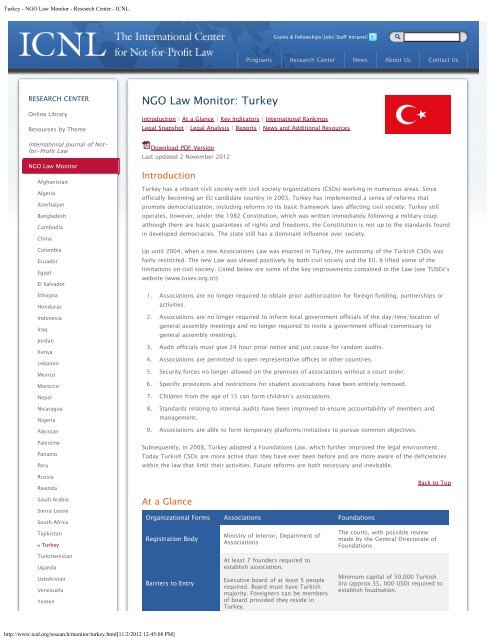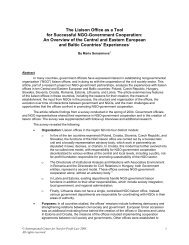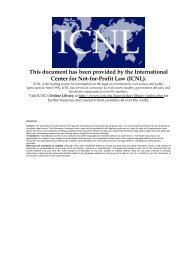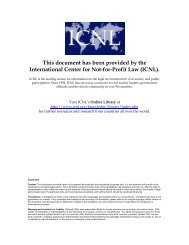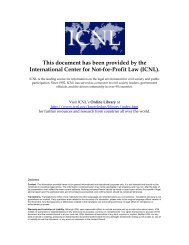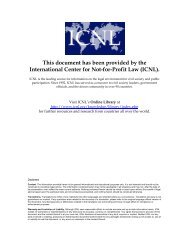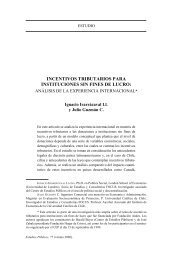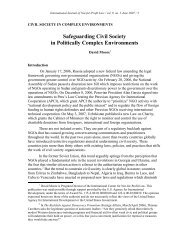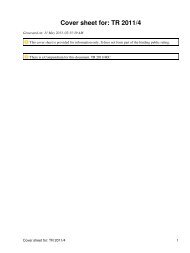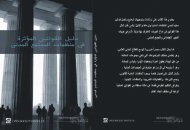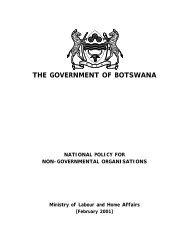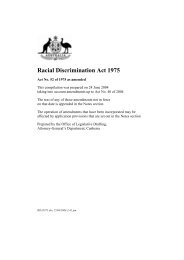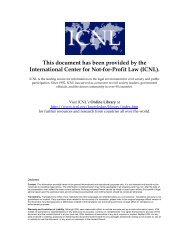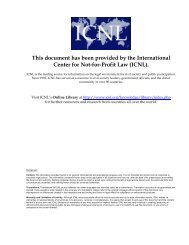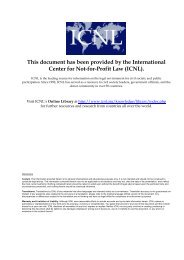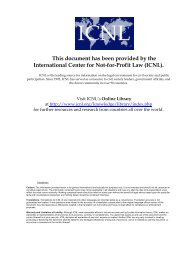Turkey - NGO Law Monitor - Research Center - ICNL
Turkey - NGO Law Monitor - Research Center - ICNL
Turkey - NGO Law Monitor - Research Center - ICNL
You also want an ePaper? Increase the reach of your titles
YUMPU automatically turns print PDFs into web optimized ePapers that Google loves.
<strong>Turkey</strong> - <strong>NGO</strong> <strong>Law</strong> <strong>Monitor</strong> - <strong>Research</strong> <strong>Center</strong> - <strong>ICNL</strong><br />
RESEARCH CENTER<br />
Online Library<br />
Resources by Theme<br />
International Journal of Notfor-Profit<br />
<strong>Law</strong><br />
<strong>NGO</strong> <strong>Law</strong> <strong>Monitor</strong><br />
Afghanistan<br />
Algeria<br />
Azerbaijan<br />
Bangladesh<br />
Cambodia<br />
China<br />
Colombia<br />
Ecuador<br />
Egypt<br />
El Salvador<br />
Ethiopia<br />
Honduras<br />
Indonesia<br />
Iraq<br />
Jordan<br />
Kenya<br />
Lebanon<br />
Mexico<br />
Morocco<br />
Nepal<br />
Nicaragua<br />
Nigeria<br />
Pakistan<br />
Palestine<br />
Panama<br />
Peru<br />
Russia<br />
Rwanda<br />
Saudi Arabia<br />
Sierra Leone<br />
South Africa<br />
Tajikistan<br />
<strong>Turkey</strong><br />
Turkmenistan<br />
Uganda<br />
Uzbekistan<br />
Venezuela<br />
Yemen<br />
http://www.icnl.org/research/monitor/turkey.html[11/2/2012 12:45:08 PM]<br />
<strong>NGO</strong> <strong>Law</strong> <strong>Monitor</strong>: <strong>Turkey</strong><br />
Introduction | At a Glance | Key Indicators | International Rankings<br />
Legal Snapshot | Legal Analysis | Reports | News and Additional Resources<br />
Download PDF Version<br />
Last updated 2 November 2012<br />
Introduction<br />
<strong>Turkey</strong> has a vibrant civil society with civil society organizations (CSOs) working in numerous areas. Since<br />
officially becoming an EU candidate country in 2003, <strong>Turkey</strong> has implemented a series of reforms that<br />
promote democratization, including reforms to its basic framework laws affecting civil society. <strong>Turkey</strong> still<br />
operates, however, under the 1982 Constitution, which was written immediately following a military coup;<br />
although there are basic guarantees of rights and freedoms, the Constitution is not up to the standards found<br />
in developed democracies. The state still has a dominant influence over society.<br />
Up until 2004, when a new Associations <strong>Law</strong> was enacted in <strong>Turkey</strong>, the autonomy of the Turkish CSOs was<br />
fairly restricted. The new <strong>Law</strong> was viewed positively by both civil society and the EU. It lifted some of the<br />
limitations on civil society. Listed below are some of the key improvements contained in the <strong>Law</strong> (see TUSEV’s<br />
website (www.tusev.org.tr)):<br />
1. Associations are no longer required to obtain prior authorization for foreign funding, partnerships or<br />
activities.<br />
2. Associations are no longer required to inform local government officials of the day/time/location of<br />
general assembly meetings and no longer required to invite a government official/commissary to<br />
general assembly meetings.<br />
3. Audit officials must give 24 hour prior notice and just cause for random audits.<br />
4. Associations are permitted to open representative offices in other countries.<br />
5. Security forces no longer allowed on the premises of associations without a court order.<br />
6. Specific provisions and restrictions for student associations have been entirely removed.<br />
7. Children from the age of 15 can form children’s associations.<br />
8. Standards relating to internal audits have been improved to ensure accountability of members and<br />
management.<br />
9. Associations are able to form temporary platforms/initiatives to pursue common objectives.<br />
Subsequently, in 2008, <strong>Turkey</strong> adopted a Foundations <strong>Law</strong>, which further improved the legal environment.<br />
Today Turkish CSOs are more active than they have ever been before and are more aware of the deficiencies<br />
within the law that limit their activities. Future reforms are both necessary and inevitable.<br />
At a Glance<br />
Organizational Forms Associations Foundations<br />
Registration Body<br />
Barriers to Entry<br />
Ministry of Interior, Department of<br />
Associations<br />
At least 7 founders required to<br />
establish association.<br />
Grants & Fellowships|Jobs|Staff Intranet|<br />
Programs <strong>Research</strong> <strong>Center</strong> News About Us Contact Us<br />
Executive board of at least 5 people<br />
required. Board must have Turkish<br />
majority. Foreigners can be members<br />
of board provided they reside in<br />
<strong>Turkey</strong>.<br />
Back to Top<br />
The courts, with possible review<br />
made by the General Directorate of<br />
Foundations<br />
Minimum capital of 50,000 Turkish<br />
lira (approx.35, 000 USD) required to<br />
establish foudnation.
<strong>Turkey</strong> - <strong>NGO</strong> <strong>Law</strong> <strong>Monitor</strong> - <strong>Research</strong> <strong>Center</strong> - <strong>ICNL</strong><br />
Zimbabwe<br />
African Union<br />
Association of Southeast<br />
Asian Nations<br />
Council of Europe<br />
League of Arab States<br />
Organization of American<br />
States<br />
Organization of the Islamic<br />
Cooperation<br />
Organization for Security<br />
and Cooperation in Europe<br />
United Nations Human<br />
Rights Council<br />
Global Trends in <strong>NGO</strong> <strong>Law</strong><br />
http://www.icnl.org/research/monitor/turkey.html[11/2/2012 12:45:08 PM]<br />
Barriers to Activities<br />
Barriers to Speech<br />
and/or Advocacy<br />
Barriers to<br />
International Contact<br />
Barriers to Resources<br />
Key Indicators<br />
Population 76, 805, 524<br />
Capital Ankara<br />
Standard annual reporting forms<br />
considered cumbersome and time<br />
consuming.<br />
Required to complete standard forms<br />
before receiving or using foreign<br />
funding or opening new branch<br />
offices.<br />
Prohibition against directly engaging<br />
in “political” activities.<br />
Required to notify Government when<br />
receiving grant from international<br />
organization.<br />
Required to notify Government before<br />
using foreign funding.<br />
Type of Government Republican Parliamentary Democracy<br />
Life Expectancy at Birth<br />
Literacy Rate<br />
Male: 70.12 years<br />
Female: 73.89 years<br />
Male: 95.3%<br />
Female: 79.6%<br />
Standard annual reporting forms<br />
considered cumbersome and time<br />
consuming.<br />
Required to complete standard forms<br />
before receiving or using foreign<br />
funding or opening new branch<br />
offices.<br />
Prohibition against directly engaging<br />
in “political” activities.<br />
Required to notify Government when<br />
receiving grant from international<br />
organization.<br />
Required to notify Government within<br />
one month of receiving foreign<br />
funding.<br />
Religious Groups Muslim(mostly Sunni): 99.8%; other(mostly Christians and Jews: 0.2%<br />
Ethnic Groups Turkish: 70-75%; Kurdish: 18%; other minorities: 7-12% (2008 est.)<br />
GDP per capita $12,200 (2009 est.)<br />
Source: The World Factbook. Washington, DC: Central Intelligence Agency, 2009.<br />
International Rankings<br />
Ranking Body Rank<br />
Ranking Scale<br />
(best – worst<br />
possible)<br />
UN Human Development Index 79 1 – 182<br />
World Bank Rule of <strong>Law</strong> Index 55.5 100 – 0<br />
World Bank Voice & Accountability Index 41.8 100 – 0<br />
Transparency International 61 1 – 180<br />
Freedom House: Freedom in the World<br />
Foreign Policy: Failed States Index<br />
Status: Partly Free<br />
Political Rights: 3<br />
Civil Liberties:3<br />
Rank: 85<br />
Human Rights: 6.0<br />
Legal Snapshot<br />
International and Regional Human Rights Agreements<br />
Back to Top<br />
Back to Top<br />
Free/Partly Free/Not<br />
Free<br />
1 – 7<br />
1 – 7<br />
177 – 1<br />
0-10<br />
Key International Agreements Ratification* Year<br />
Back to Top
<strong>Turkey</strong> - <strong>NGO</strong> <strong>Law</strong> <strong>Monitor</strong> - <strong>Research</strong> <strong>Center</strong> - <strong>ICNL</strong><br />
http://www.icnl.org/research/monitor/turkey.html[11/2/2012 12:45:08 PM]<br />
International Covenant on Civil and Political Rights (ICCPR) Yes 2003<br />
Optional Protocol to ICCPR (ICCPR-OP1) Yes 2006<br />
International Covenant on Economic, Social, and Cultural Rights (ICESCR) Yes 2003<br />
Optional Protocol to ICESCR (OP-ICESCR) No --<br />
International Convention on the Elimination of All Forms of Racial<br />
Discrimination (ICERD)<br />
Convention on the Elimination of All Forms of Discrimination Against<br />
Women (CEDAW)<br />
Optional Protocol to the Convention on the Elimination of Discrimination<br />
Against Women<br />
Yes 2002<br />
Yes 1985<br />
Yes 2002<br />
Convention on the Rights of the Child (CRC) Yes 1995<br />
International Convention on the Protection of the Rights of All Migrant<br />
Workers and Members of their Families (ICRMW)<br />
Yes 2004<br />
Convention on the Rights of Persons with Disabilities (CRPD) Yes 2009<br />
* Category includes ratification, accession, or succession to the treaty<br />
Constitutional Framework<br />
The Constitution was adopted in 1982, immediately following a military coup. Although the Constitution is<br />
sometimes criticized for its lack of democratic principles, it still guarantees basic rights and freedoms.<br />
Relevant articles include:<br />
Article 22: Everyone has the right to freedom of communication.<br />
Article 25: Everyone has the right to freedom of thought and opinion.<br />
Article 26: Everyone has the right to express and disseminate his thoughts and opinions by speech, in<br />
writing or in pictures or through other media, individually and collectively.<br />
Article 33: Everyone has the right to form associations, or become a member of an association, or<br />
withdraw from membership without prior permission.<br />
No one shall be compelled to become or remain a member of an association.<br />
Freedom of association may only be restricted by law on the grounds of protecting national security<br />
and public order, or prevention of crime, or protecting public morals, public health.<br />
The formalities, conditions, and procedures governing the exercise of freedom of association shall be<br />
prescribed by law.<br />
Associations may be dissolved or suspended from activity by the decision of a judge in cases<br />
prescribed by law. In cases where delay endangers national security or public order and in cases where<br />
it is necessary to prevent the perpetration or the continuation of a crime or to effect apprehension, an<br />
authority designated by law may be vested with power to suspend the association from activity. The<br />
decision of this authority shall be submitted for the approval of the judge in charge within twenty-four<br />
hours. Unless the judge declares a decision within forty-eight hours, this administrative decision shall<br />
be annulled automatically.<br />
Provisions of the first paragraph shall not prevent imposition of restrictions on the rights of armed<br />
forces and security forces officials and civil servants to the extent that the duties of civil servants so<br />
require.<br />
The provisions of this article are also applicable to foundations.<br />
Article 34: Everyone has the right to hold unarmed and peaceful meetings and demonstration marches<br />
without prior permission.<br />
Article 35: Everyone has the right to property and inheritance.<br />
National <strong>Law</strong>s and Regulations Affecting Sector<br />
Relevant national laws include the following:<br />
<strong>Law</strong> 5253: Associations <strong>Law</strong><br />
<strong>Law</strong> 5737: Foundations <strong>Law</strong><br />
<strong>Law</strong> 4721: Civil Code<br />
Associations: Articles 56-100<br />
Foundations: Article 101-117<br />
<strong>Law</strong> 2860: <strong>Law</strong> on Collection of Donations
<strong>Turkey</strong> - <strong>NGO</strong> <strong>Law</strong> <strong>Monitor</strong> - <strong>Research</strong> <strong>Center</strong> - <strong>ICNL</strong><br />
http://www.icnl.org/research/monitor/turkey.html[11/2/2012 12:45:08 PM]<br />
<strong>Law</strong> 2911: <strong>Law</strong> on Demonstrations<br />
<strong>Law</strong> 4962: Tax Exemption for Foundations<br />
Income Tax <strong>Law</strong><br />
Corporate Tax <strong>Law</strong><br />
Property Tax law<br />
VAT <strong>Law</strong><br />
Pending <strong>NGO</strong> Legislative / Regulatory Initiatives<br />
There are no pending legislative or regulatory initiatives.<br />
Legal Analysis<br />
Organizational Forms<br />
Back to Top<br />
There are two legal forms of CSOs in <strong>Turkey</strong>: associations and foundations. Article 33 of the Constitution<br />
grants the right to form these entities. These organizations must be not-for-profit establishments. Article 56<br />
of the Civil Code states: “An association is defined as a society formed by unity of at least seven real persons<br />
or legal entities for realization of a common object other than sharing of profit by collecting information and<br />
performing studies for such purpose.” Article 101 of the Civil Code defines foundations as “charity groups in<br />
the status of a legal entity formed by real persons or legal entities dedicating their private property and rights<br />
for public use.”<br />
Associations are registered with the Department of Associations under the Ministry of Interior. Although many<br />
associations believe that the registration process is being handled according to the law, they still claim that<br />
the process is slow and cumbersome at times. All associations have to form a general assembly, an executive<br />
board consisting of five individuals, and an auditing committee of three persons.<br />
Foundations are established and registered through a court decree. The court may ask the General Directorate<br />
of Foundations to review each application. Foundations only need form an administrative body. Additionally,<br />
foundations must have a minimum capital of 50.000 Turkish Liras (app. 35.000 USD).<br />
Public Benefit Status<br />
The law in <strong>Turkey</strong> provides for public benefit status for CSOs, but only a very limited number of organizations<br />
have been granted public benefit status. To illustrate: Out of more than 84,000 registered associations, only<br />
about 420 are recognized as public benefit organizations.<br />
Article 27 of the Associations <strong>Law</strong> grants authority to the Council of Ministers to determine which CSOs can<br />
be granted this status. Article 20 of <strong>Law</strong> 4962 provides the legal basis for tax exemptions of those<br />
foundations that are granted public benefit status.<br />
Associations and foundations seeking public benefit status must secure the approval of the Council of<br />
Ministers. Upon receiving an application for public benefit status, the Council of Ministers must determine<br />
whether or not the activities of the CSO actually benefit the general public and are not intended to serve any<br />
one particular group. Since the law does not provide a clear definition of what activities constitute “public<br />
benefit”, the decision-making process is subject to discretion of the Council. Unsurprisingly, decisions are<br />
sometimes perceived as being highly political. However, there are specific minimum requirements in the law<br />
which CSOs must meet; for instance, foundations must spend more than two-thirds and associations more<br />
than half of their revenue toward their mission.<br />
Barriers to Entry<br />
All Turkish citizens can establish or be a member of associations. Some restrictions are applicable, however,<br />
to military and security personnel, judges and attorneys working under the Ministry of Justice and some other<br />
government officials working within designated ministries. In addition, only foreigners with a residence permit<br />
are permitted to found or join an association in <strong>Turkey</strong>.<br />
In general, if the regulations are satisfied, <strong>NGO</strong>s will not be refused registration. Article 56 states that “No<br />
association may be formed for an object contrary to the laws and ethics.” Article 101 of the Civil Code states<br />
that “Formation of a foundation contrary to the characteristics of the Republic defined by the Constitution,<br />
Constitutional rules, laws, ethics, national integrity and national interest, or with the aim of supporting a<br />
distinctive race or community, is restricted.” Moreover, the required content of the association by-laws is<br />
overly detailed.
<strong>Turkey</strong> - <strong>NGO</strong> <strong>Law</strong> <strong>Monitor</strong> - <strong>Research</strong> <strong>Center</strong> - <strong>ICNL</strong><br />
http://www.icnl.org/research/monitor/turkey.html[11/2/2012 12:45:08 PM]<br />
The Foundations <strong>Law</strong> sets a minimum capital requirement of 50.000 Turkish Liras (app. 35.000 USD) in order<br />
to establish a foundation. Although there is no minimum requirement for founders or members for<br />
foundations, at least seven founders are required to form an association. Additionally, associations are<br />
required to form an executive board made up of at least five people, while foundations are only “encouraged”<br />
to do so. Foreigners can be members of boards as long as they reside in <strong>Turkey</strong>. However, the executive<br />
board must still have a Turkish majority.<br />
According to implementing regulations for the Associations <strong>Law</strong>, associations seeking office space within<br />
residential buildings must secure the permission of all residents living in the building – a requirement that is<br />
burdensome at best, and in some cases practically impossible. The failure to secure office space may prove a<br />
barrier to the process of registration for associations.<br />
In order to form a federation or a confederation, the Associations <strong>Law</strong> requires a minimum of 5 and 3<br />
organizations, respectively, to come together. Problematically, however, the law requires that member<br />
organizations must have the “same purpose”, which is unnecessarily limiting.<br />
Barriers to Operational Activity<br />
In general, Turkish CSOs are free to operate and are free from government harassment such as frequent<br />
inspections, requests for documentation, etc. Government officials are prohibited from attending meetings<br />
and CSOs can hold internal meetings free from external pressure. CSOs are not required to inform the<br />
government about their programs and projects.<br />
There are, however, some standard forms that CSOs must complete each year which can be cumbersome and<br />
time consuming for some organizations. Specifically, associations and foundations must complete annual<br />
statements which are submitted either to the Interior Ministry, Department of Associations or to the General<br />
Directorate of Foundations. Additionally, CSOs must complete standard forms before receiving and/or<br />
utilizing foreign funding and opening new branches or offices.<br />
In addition, CSOs frequently are fined for “improper” record keeping. More disturbingly, Article 33 of the<br />
Associations <strong>Law</strong> holds the chair of the executive board of the association responsible – i.e., personally liable<br />
– for any sanctions and/or fines assessed against the association.<br />
Foreign organizations are subjected to serious bureaucratic rules when opening a branch office in <strong>Turkey</strong>.<br />
If a CSO becomes involved in an illegal activity, the organization can be terminated by a court order.<br />
Organizations that violate the law can be terminated only with a court order.<br />
Barriers to Speech / Advocacy<br />
CSOs are prohibited from directly engaging in political activities, although the term “political” is nowhere<br />
defined in the law. However, many CSOs work to influence public policy in their related field, and are<br />
therefore involved in public policy debate. Nonetheless, the government-CSO relationship is weak. CSOs<br />
struggle to have substantial influence in the formation of public policy. The most recent EU Progress Report<br />
on <strong>Turkey</strong> highlights the reluctance of the Government to work with CSOs on the reform agenda. It is difficult<br />
for <strong>NGO</strong>s to gain access to parliamentary committees. Additionally, the Department of Associations and the<br />
General Directorate of Foundations, the two government organs in charge of relations with CSOs, do not have<br />
strong ties with the sector and there are no rules setting the standard for such relationships.<br />
Furthermore, some human rights organizations complain about the law-suits brought against them, which<br />
they interpret as harassment. A survey under the Civil Society Index Project (CSI) revealed that 63% of<br />
respondents (stakeholders within civil society) perceived that the state exerts some limitations on the<br />
advocacy activities of CSOs. Although <strong>Turkey</strong> has taken serious steps toward creating a more enabling<br />
environment for CSOs, there remains a culture of state control and domination over civil society.<br />
Barriers to International Contact<br />
There are no restrictions for Turkish CSOs to operate in other countries. But when receiving a grant from an<br />
international organization, CSOs must notify the appropriate government office. International CSOs operating<br />
in <strong>Turkey</strong> must receive permission from the Government prior to starting their activity.<br />
Barriers to Resources<br />
Foreign Funding<br />
There are no limitations on foreign funding, but there is a notification requirement relating to foreign<br />
funding. Foundations must notify public authorities within one month after receiving the funding, while<br />
associations must notify the Government before using the funding.<br />
Domestic Funding
<strong>Turkey</strong> - <strong>NGO</strong> <strong>Law</strong> <strong>Monitor</strong> - <strong>Research</strong> <strong>Center</strong> - <strong>ICNL</strong><br />
http://www.icnl.org/research/monitor/turkey.html[11/2/2012 12:45:08 PM]<br />
There are no special government programs providing funding for CSOs. Local authorities and municipalities<br />
provide more funding then the central government. There are no clear laws or regulations governing public<br />
funding for CSOs.<br />
Both associations and foundations can engage directly in economic activities, establish and/or become<br />
partners in economic enterprises or companies. Although CSO income is not generally subject to corporate<br />
tax, the income from economic activities is taxable.<br />
Donors to public benefit organizations can claim a tax deduction of up to 5% of their taxable income.<br />
Reports<br />
UN Universal Periodic Review Reports Not available<br />
Reports of UN Special Rapporteurs <strong>Turkey</strong><br />
USIG (United States International<br />
Grantmaking) Country Notes<br />
U.S. State Department<br />
Not available<br />
Back to Top<br />
2008 Country Reports on Human Rights Practices: <strong>Turkey</strong><br />
Advancing Freedom and Democracy Reports, 2009: <strong>Turkey</strong><br />
Failed States Index Reports Foreign Policy: Failed States Index 2012<br />
IMF Country Reports <strong>Turkey</strong> and the IMF<br />
TUSEV Not available<br />
International <strong>Center</strong> for Not-for-Profit<br />
<strong>Law</strong> Online Library<br />
News and Additional Resources<br />
<strong>Turkey</strong><br />
Back to Top<br />
While we aim to maintain information that is as current as possible, we realize that situations can rapidly<br />
change. If you are aware of any additional information or inaccuracies on this page, please keep us<br />
informed; write to <strong>ICNL</strong> at ngomonitor@icnl.org.<br />
General News<br />
Police fire tear gas at Republic Day protesters (October 2012)<br />
Police in <strong>Turkey</strong> have fired tear gas and used water cannons to disperse thousands of pro-secular protesters<br />
who marched in the capital Ankara to mark Republic Day. The rally organised by dozens of civil society<br />
organisations and backed by some opposition parties began outside the first parliament building in the<br />
historic Ulus district.<br />
Journalists targeted by smear campaign (September 2012)<br />
Reporters Without Borders is very disturbed by the aggressive smear campaign that the Islamist and<br />
nationalist daily Yeni Akit (New Agreement) and its website, Habervaktim.com, have been waging in recent<br />
days against four leading journalists - Ali Bayramoglu, Cengiz Candar, Hasan Cemal and Yasemin Congar -<br />
because of their views on <strong>Turkey</strong>'s Kurdish issue. Politicians are also being attacked. "By targeting people<br />
committed to tolerance and peace, this campaign is trying to block any evolution in Turkish society,"<br />
Reporters Without Borders said. "Experience has shown the degree to which this kind of prejudiced,<br />
xenophobic and paranoid discourse is not just harmful but also dangerous. Words have meaning and the<br />
accusations levelled against these journalists expose them to real peril. This virulent hate campaign must<br />
stop at once and everything possible must be done to protect its targets."<br />
Government cracks down on trade union activists (July 2012)<br />
Mr. Osman İşçi, the Euro-Mediterranean Human Rights Network executive member and the Human Rights<br />
Association’s International Relations former expert, was reportedly detained in Ankara on the morning of June<br />
25. It is also reported that there are warrants of arrest for 58 trade unionists. Police teams have been raiding<br />
various branches of trade unions of the Koma Ciwaken Kurdistan-Kurdistan Communities League. The KCK is<br />
accused of being an umbrella organization that includes the Kurdistan Workers Party (PKK).<br />
Confirmed pre-trial detention of defender Osman Isci and 27 trade union members: Joint press release (July<br />
2012)<br />
The undersigned organizations express their deepest concern regarding the decision of the court to place in
<strong>Turkey</strong> - <strong>NGO</strong> <strong>Law</strong> <strong>Monitor</strong> - <strong>Research</strong> <strong>Center</strong> - <strong>ICNL</strong><br />
© 2012 International <strong>Center</strong> for Not-for-Profit <strong>Law</strong> (<strong>ICNL</strong>) Site Map|Privacy Policy / Terms of Use<br />
http://www.icnl.org/research/monitor/turkey.html[11/2/2012 12:45:08 PM]<br />
detention 28 trade union members, including Osman Işçi.<br />
<strong>NGO</strong> report slams Turkish government (May 2012)<br />
Amnesty International slammed the Turkish government in its annual report on several counts ranging from<br />
the Kurdish issue to children’s rights. The report, which was released yesterday, said promises made by the<br />
Turkish government were not upheld. The right to freedom of expression was threatened and protesters faced<br />
increased police violence, the report said.<br />
Turkish civil society "far behind" Europe and weak in the country's eastern region (March 2012)<br />
A report outlining the current state of Turkish civil society has indicated that it is far behind European<br />
average both in terms of numbers and diversity, leaving one of the essential pillars of the democracy weak.<br />
For example, the total number of civil society institutions in <strong>Turkey</strong> is only 153,800. In the United Kingdom,<br />
which has fewer people than <strong>Turkey</strong>, there are 873,000 organizations along with 800,000 in France. In<br />
addition, some 75 percent of all civil society institutions in <strong>Turkey</strong> are situated in the major cities in Istanbul,<br />
Ankara and Izmir.<br />
News Archive<br />
European Union critical of human rights in <strong>Turkey</strong> (October 2011)<br />
Clinton urges <strong>Turkey</strong> to uphold rights, press freedom (July 2011)<br />
<strong>Turkey</strong>’s civil society organizations increase by 44 percent in 10 years (June 2011)<br />
Activists prosecuted for criticising the judges (February 2011)<br />
Human Rights Watch slams journalists' arrests in <strong>Turkey</strong> (March 2010)<br />
EU raises concern about press freedom, politics in <strong>Turkey</strong> (November 2010)<br />
FIDH supports joint declaration of its member organizations in <strong>Turkey</strong> and Armenia (April 2010)<br />
<strong>Turkey</strong>: Summary of Amnesty International’s Concerns in <strong>Turkey</strong>, July to December 2009 (March 2010)<br />
Amnesty International criticizes judicial harassment of LGBT association (January 2010)<br />
<strong>Turkey</strong> Critized for Closing Pro-Kurdish Political Party (December 2009)<br />
<strong>NGO</strong>s unite to demand say in human rights bill (November 2009)<br />
The foregoing information was collected by the <strong>ICNL</strong> <strong>NGO</strong> <strong>Law</strong> <strong>Monitor</strong> partner in <strong>Turkey</strong>, TUSEV.<br />
Back to Top


